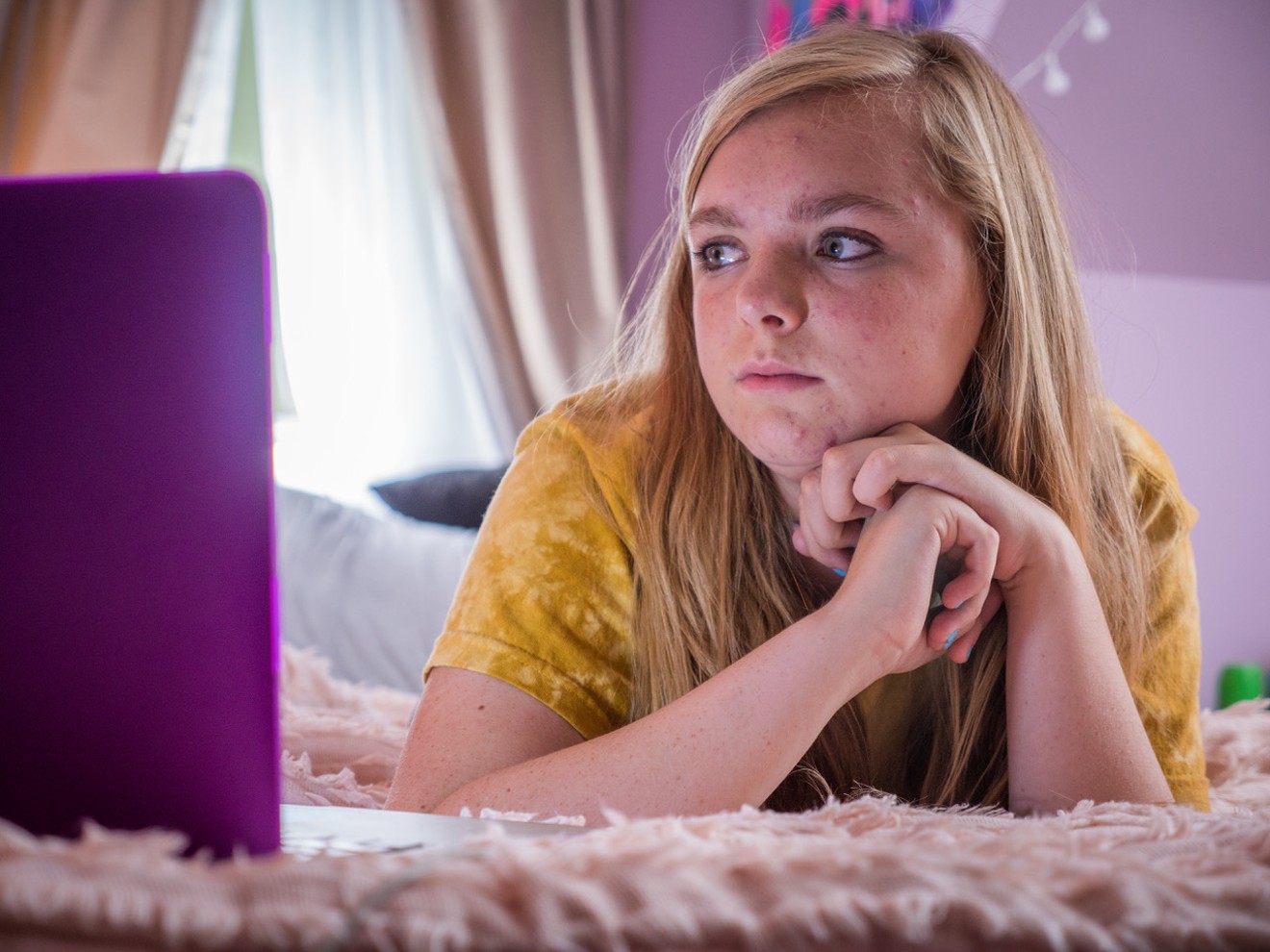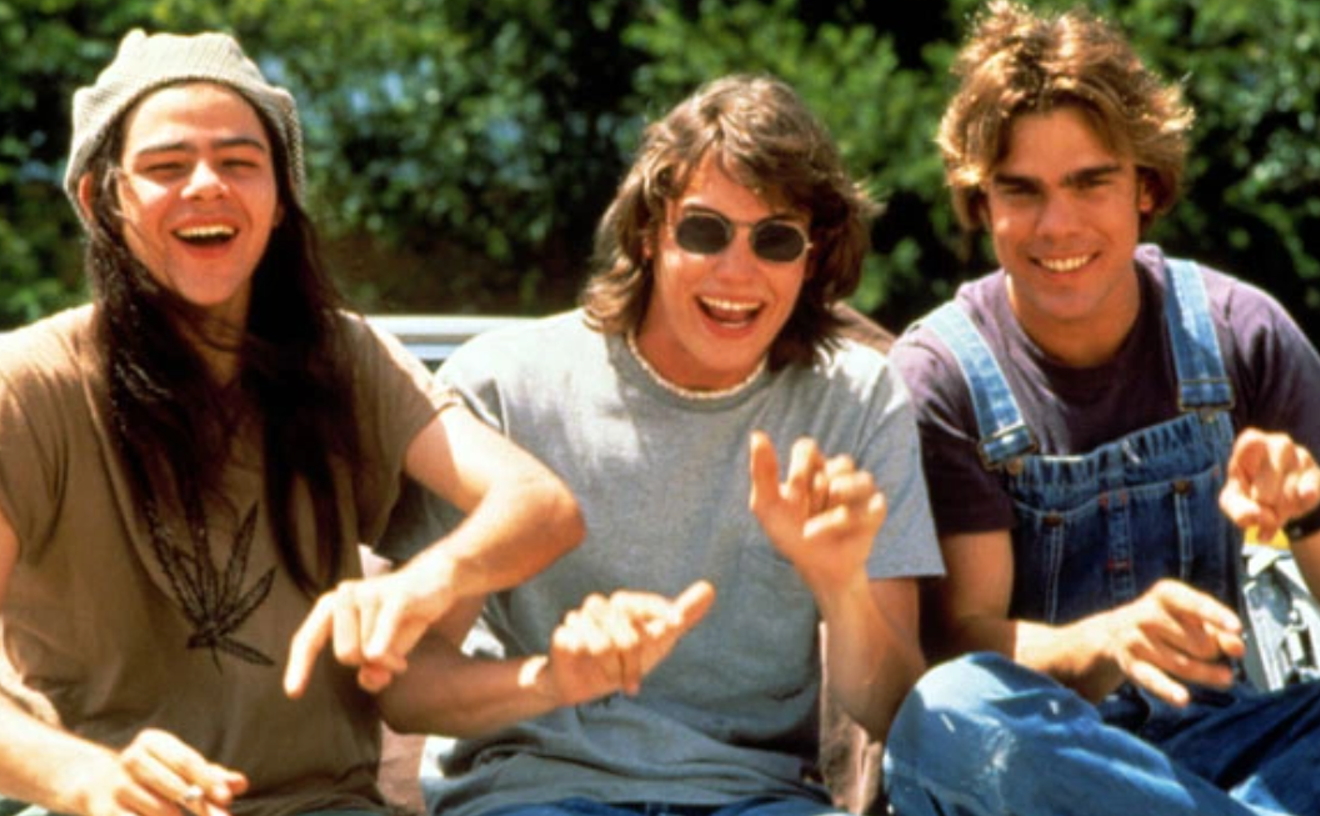Take a Trip Through Teenage Hell With Eighth Grade
Bo Burnham wanted to make an honest film about how the internet affects teenagers.
July 7, 2018

Elsie Fisher in Bo Burnham's Eighth Grade.
Courtesy of A24
[
{
"name": "Air - MediumRectangle - Inline Content - Mobile Display Size",
"component": "18478561",
"insertPoint": "2",
"requiredCountToDisplay": "2"
},{
"name": "Editor Picks",
"component": "16759093",
"insertPoint": "4",
"requiredCountToDisplay": "1"
},{
"name": "Inline Links",
"component": "17980324",
"insertPoint": "8th",
"startingPoint": 8,
"requiredCountToDisplay": "7",
"maxInsertions": 25
},{
"name": "Air - MediumRectangle - Combo - Inline Content",
"component": "16759092",
"insertPoint": "8th",
"startingPoint": 8,
"requiredCountToDisplay": "7",
"maxInsertions": 25
},{
"name": "Inline Links",
"component": "17980324",
"insertPoint": "8th",
"startingPoint": 12,
"requiredCountToDisplay": "11",
"maxInsertions": 24
},{
"name": "Air - Leaderboard Tower - Combo - Inline Content",
"component": "16759094",
"insertPoint": "8th",
"startingPoint": 12,
"requiredCountToDisplay": "11",
"maxInsertions": 24
}
]
One of the higher-profile movies to play at this year’s Phoenix Film Festival was Eighth Grade, Bo Burnham’s chronicle of a few days in the life of Kayla (Elsie Fisher), a middle school kid, as she wraps up the title year. The sometimes funny, sometimes poignantly painful slice of adolescent life opens for general release here in the Valley on Friday, July 20.
Phoenix New Times had the opportunity to sit down with Burnham, a comedian and actor who makes his debut as a writer-director with this film. Some highlights:
New Times: What was eighth grade like for you?
Burnham: It was … weird. I don’t remember it, totally … I don’t want this to be a dodge, but it was way less of a reference than you’d think it would be. I wanted to make a movie about how I was feeling now, and about what it’s like to be in eighth grade now … I was a ham, I was in Footloose … I don’t remember being that introspective even then. Not to be cruel, but I think us boys at that age are just a little more closed off and aren’t even admitting our feelings to ourselves yet. Sophomore was sort of my toughest year. That was my eighth grade, was sophomore year.
Where did this movie come from? What was the inspiration for it?
I wanted to write about the internet. I didn’t feel like the internet was being talked about. And I wanted to write about what I was feeling at the time, which was anxious. And I felt like my anxiety was linked to the internet somehow. It felt like they were feeding off of each other. So I set out to write a bunch of things, like a big tandem narrative with all these characters, and I stumbled on her, and found that, oh, I can say I everything I want to …And it makes sense; because I think my feelings of anxiety kind of reduce me to a feeling of being 13, and I think a lot of people on the internet behave like eighth graders.
The reference point here was not teen flicks?
No, definitely not. Initially, it was like, even though it didn’t stylistically end up like this, it was like, what if you did The Wrestler with an eighth grade girl. I wanted to do something that took it very seriously. Because a lot of teen flicks, to me, and they can be wonderful, but a lot of them are presented nostalgically, through the lens of an adult looking back, and I didn’t want it to be like that, I wanted it to be from a much more visceral level.
That’s not what I was expecting. I thought this was a corrective for teen flicks. This is the teen flick where it’s a little more like what it’s really like, and everybody isn’t so epigrammatic.
That was a huge part of this, watching teen movies and going like, everybody’s a little Poet Laureate, so over-articulate. The story of being young, or even being human, is like, failing to have words for what you’re going through, and what you say is such a pale imitation of what you’re feeling. So that was part of it, watching movies that would open with voice-overs with the kid speaking fluently. A kid shouldn’t have to be like this in a movie to be liked by an adult audience. Or even to be relatable. I didn’t say a complete sentence until I was 23. So it was a corrective.
Not consciously?
It probably was. I don’t like to think I came from a negative place, but it was that. It was going, I don’t feel like I’m seeing what it’s actually like to be a kid. Unless it’s in some crazy Scandinavian movie that’s super dark and depressing.
Where did you find this girl [star Elsie Fisher]?
She was the voice of the youngest girl in Despicable Me 1 & 2, so she was a voice actor when she was like 5 and 6; she was in a few movies and then she took a few years off, because the world of being a child actor is hell, and she didn’t enjoy it. I found an interview of her, just being interviewed at some weird event, and she was just immediately, arrestingly right. So I brought her in, and she could act. I really wanted it to feel like a shy kid pretending to be confident, not a confident kid pretending to be shy, which is what everyone else felt like, and to find the balance of someone who was vulnerable enough to feel the pain and self-consciousness that she feels, but also had the strength to carry a movie on her shoulders. It felt like an impossible ask, but she is it. She’s very in control of her performance. She’s not improvising; I’m not tricking her into doing these things. These performances were, take after take, very reliable.
One of the scenes that will be very familiar to many parents comes when her single father is trying to get her to put down her phone at the dinner table and talk. Where did that come from?
There’s a clichéd scene of a girl at the table on her phone, and her dad’s trying to get her attention. That’s a cliché. But what if we could arrive at that scene and understand exactly why she needs to bury her head in this phone and doesn’t want to talk to this guy? You see the day she had at school, which sucked, and all she wants to do is sit there and maybe not think about anything. That’s the thing, when you’re on your phone, you’re often not even having to think about yourself, you just kind of obliterate yourself. It’s like gambling or something, you know, just not thinking. The hope is to arrive at the scene and, partly, have dads watching the movie want to turn to the dad and go “shut up!” Obviously I understand where he’s coming from, but at that moment I’m feeling with her, going “Shut up, dude.”
One of the things I noticed about the script, and it seemed deliberate, is that there were a lot of loose ends.
The story takes place over five or six days, and I wanted the story to be occurring in a way that it naturally would in life, which is that not everything’s going to appear and resolve. Especially at that age. The story of that age is irresolution. Nobody’s getting to the end of 13 and going, I figured out 13.
I also liked how your heroine didn’t have cool interests pasted on to her, to make her more interesting.
I still think cultural stuff is completely decorative. And sometimes these movies make it look like, oh, since she’s into Velvet Underground that means she’s better than everybody else. I think that’s completely bullshit, it’s just a way to insulate yourself. If an eighth-grade kid had a vinyl collection, that is so sad. That is, oh, you’re imitating what you think a cool person is. I was wondering, do we need to give her an interest? And I was like, fuck that. Because the movie isn’t really supposed to be about, what adult is she going to be when she grows up? Is she going to have an interest that pays off for her in the long run? Or the thing I really don’t like, which is, yeah, she’s a nerd now, but one day all these people will be pumping her gas, which I think is like its own form of elitism, and disgusting. Oh don’t worry, the jock kid will be poor one day. That’s awful. The point being, you are a blank, you’re blanker than I think you think you are at that age. You pretty much are just a bunch of nerve endings. I think the most common passion for kids is just being loved and being liked. I didn’t want it to be that in order to be worthy of love, and our attention as viewers, she has to be exceptionally interesting.
Okay, so we’ve established what the movie isn’t about. What is it about, do you think?
It’s about being in your head. It’s about having a brain in your head and a heart in your chest, being a subjective person walking through the world, in the age of the internet where it feels like you have to live your life, and you have to watch other people live their lives, you have to watch them watch you watch them. It’s like a pressure that a lot of us feel, especially kids, is the feeling that my biggest worry is that the movie of my life would suck. That’s almost her feeling. That I am unwatchable, I’m uninteresting, my story isn’t great, so I tell a lie about it. And what we’re saying is that your struggle to make a story be watchable, is watchable.

KEEP NEW TIMES FREE...
Since we started New Times, it has been defined as the free, independent voice of Phoenix, and we'd like to keep it that way. Your membership allows us to continue offering readers access to our incisive coverage of local news, food, and culture with no paywalls.
You can support us by joining as a member for as little as $1.

M.V. Moorhead
Contact:
M.V. Moorhead


Newsletter Sign Up
Enter your name, zip code, and email
I agree to the Terms of Service and
Privacy Policy
Sign up for our newsletters
Get the latest
arts & culture
news, free stuff and more!
Trending
Use of this website constitutes acceptance of our
terms of use,
our cookies policy, and our
privacy policy
The Phoenix New Times may earn a portion of sales from products & services purchased through links on our site from our affiliate partners.
©2024
Phoenix New Times, LLC. All rights reserved.
Do Not Sell or Share My Information
Do Not Sell or Share My Information







